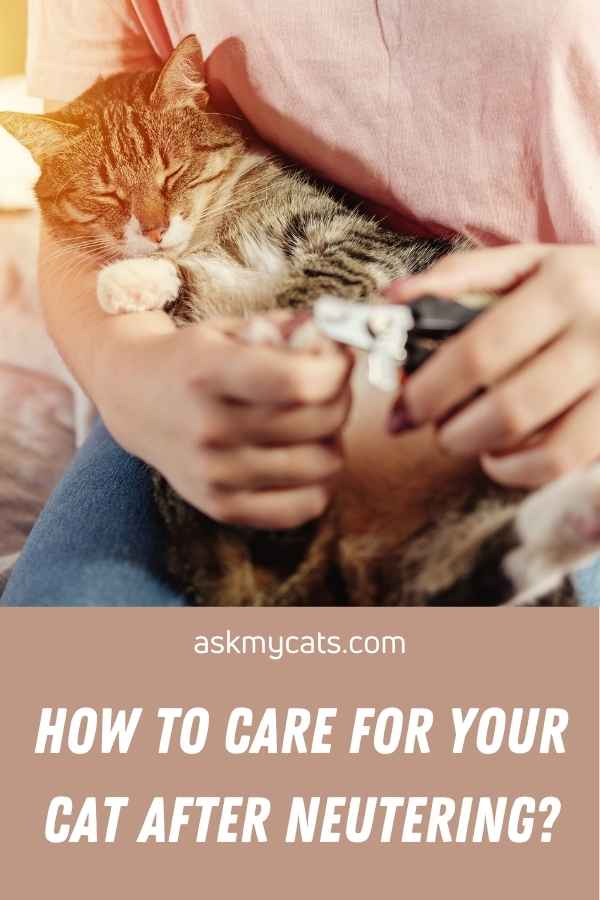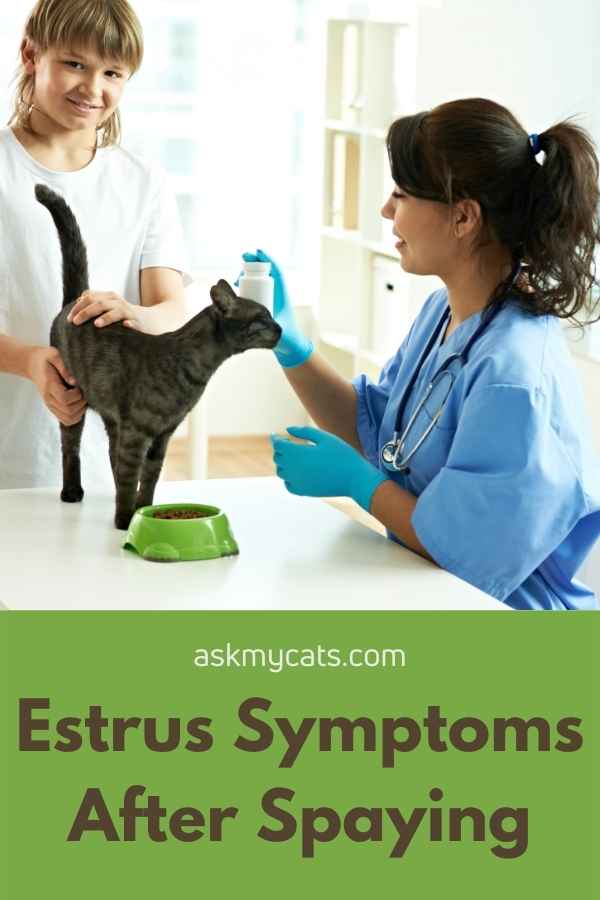Is it time to neuter or spay your cat? Congratulations on your achievement! Make sure your plans include a recovery time for the spay or neuter procedure.
Your attention to aftercare during the crucial neuter or spay recovery period may mean the difference between comfort and pain.
The good thing is that in cats, the post-operative recovery time is usually dull. That is to say, cats almost always make a full recovery. After being spayed or neutered, the majority appear to never miss a step.
The cat must be acting hyper or showing aggressive signs because of the trauma he faced during surgery. The journey to the vet, and deep anesthesia, all cumulated to the erratic behaviors exhibited by the cat.
Spaying is a more complex procedure that involves a long abdominal incision through many layers, organ removal, and sutures or staples. The procedure takes longer, and recovery from anesthesia is slower than in males, which results in enormous pain for your poor kitty.
Most cat owners believe that neutering their cats would make them healthier and better behaved animals.
While the procedure is both cost-effective and advantageous to the pet, it is critical that you understand how to care for your pet after the procedure properly.
It’s a good idea to be aware of the dos and don’ts of caring for a neutered cat. Here are some key points to keep in mind.


Give Your Cat the Perfect Day
Get the Free Ebook!
Aggression Among Cats After Neutering

The majority of the time, you can see nothing. Again, the majority of side effects are medication-related rather than neuter-related.
After all, feline testicles are small little creatures with few nerve endings attached to them – at least not at the age when most kittens are neutered.
If there are any negative, veterinary-visit-worthy events to look out for, they usually include post-operative bleeding.
Any bleeding or excessive licking could prompt you to take your neutered cat to the vet for a check-up.
Your cats’ personalities can change if they are spayed or neutered. Hormones control the behavior of unfixed kittens.
Females who are in heat are agitated, fearful, and vocal.
They are attracted to all unneutered males in the area. Unneutered males are more likely to become annoyed and aggressive, become territorial by spraying around the home, and battle any male they come across.
Unlike territorial attack or terrorist aggression, the pair of cats may get on perfectly well most of the time, but occasionally the male, charges a female neutered cat, clearly not receptive, who shouts from behind, bite her in the neck and fly her to the ground.
A cat’s sense of smell is extremely vital, and any self-respecting male should be able to detect the odor of the same or opposite sex.
While an intact male cat can smell a female in heat from several blocks away, a neutered female does not have the same olfactory attraction.
You will surely like to check out the reasons behind cat very active after spaying
What Is The Impact Of Spaying And Neutering On Your Pet?
Your pet’s personality is defined by his or her emotional makeup. Genetics and socialization play a big role in it. Your pet’s behavior is a consequence of his personality in relation to his surroundings.
Behavior can usually be adjusted, but personality can only be monitored. Keeping this in mind, spaying, and neutering will help to minimize, if not completely eradicate, a variety of undesirable behaviors like jumping after surgery.
By removing the female and male sex hormones produced by the ovaries and testicles, spaying and neutering affect behavior.
Spaying prevents a female from joining a heat cycle by lowering estrogen levels. Neutering males, who, unlike females, are always in heat, inhibit the release of testosterone.
You might also like to read how to keep your cat from jumping after surgery
Common Unwanted Behaviours After Neuter:

1. Roaming
An unmarried female may flee in search of a male with whom to mate. This isn’t romantic courtship; rather, it’s an instinctual response to a heat cycle.
In dogs, heat cycles occur twice a year, while in cats, they occur every one to three weeks. They are most sexually active and capable of reproducing at this time.
Roaming puts your pet at risk of being hit by a car and lost, wounded, or killed.
The wish to wander can be abolished by eliminating the estrogen-producing ovaries and uterus.
2. Spontaneous Urination
During a heat cycle, females may urinate to attract males.
Pet urine is difficult to completely remove, and its presence encourages other animals to “scent post,” or urinate repeatedly over the area.
3. Irritability
Heat cycles cause hormone levels to fluctuate, which can lead to irritability. Excessive whining, restlessness, and fear are all signs of irritability.
Females who have been spayed do not experience these hormonal changes. After being spayed, your pet’s behavior will most likely become more cohesive.
Find out the reasons for Cat Lathergic After Spay
4. Aggression
When vying for male attention, females may become predatory. When a female becomes pregnant, she may become aggressive toward you or those who come close to her litter.
Females who have been spayed have a lower urge to find a mate, and the chances of pregnancy are almost non-existent.
5. Bleeding
A female’s vulva swells and she bleeds when she is in heat. The bleeding usually lasts two weeks.
Owners should buy special diapers that (believe it or not) most dogs dislike wearing to prevent blood from leaking everywhere.
6. Unwanted Attention
A male dog should detect a female dog in heat from a distance of three miles, and a male cat from a distance of one mile.
If at all possible, any intact male dog or cat will show up at your door.
Also, check out the reasons behind cat suddenly walking like drunk
How To Care For Your Cat After Neutering?

1. After Arriving Home
Your cat will most likely experience some anesthetic effects if you bring him home.
Typically, vets apply a protective ointment to their eyes to prevent them from drying out. The ointment may cause the cat’s vision to become blurry.
As a result, you must confine him to a gloomy, warm, and calm indoor environment for the first twenty-four hours after surgery.
Other pets, including children, should be kept away from the cat during this period.
When afraid, even the most affectionate and sweet cat can become vicious, biting or scratching something.
Anesthesia hangovers will go away within 24 hours. After this time, your cat’s personality normally returns to normal.
Veterinarians recommend that you spend the first night with your cat to observe his activity levels and meticulously monitor his recovery.
2. Water And Food
You should give your cat water when he returns home from the vet. To prevent vomiting, the amount should be kept to a minimum.
In a bowl, just retain a small amount of water and top it off as needed. When your cat is awake and alert, you can give him a quarter to half of his usual food intake.
You would remove the remainder of the meal if he vomits. Wait until the next morning to give meals again.
Give your cat normal quantities of water and food the day after surgery. It’s normal if your cat doesn’t eat right away because the anesthetics may make him feel nauseous.
However, if your feline pal isn’t drinking or eating normally 48 hours after surgery, you can contact your veterinarian right away.
Interesting Read: Can I Feed My Cat After Neutering?
3. Medicinal Help
It’s customary for your cat to suffer some mild pain and soreness 24 to 36 hours after surgery. As a result, after surgery, veterinarians administer long-acting pain medication in the form of an injection to dogs.
Most pain relievers, including those containing acetaminophen, aspirin, or ibuprofen, are prohibited by experts because they are known to cause serious complications and, in extreme cases, death.
If you believe your cat requires pain medication, you should first consult your veterinarian. It’s critical that you follow your veterinarian’s directions for the medications he or she prescribes.
4. Habits In The Bathroom
Even though your cat refuses to eat, he still wants to go to the bathroom. As a result, you should place a spotlessly clean litter box near your cat’s favorite resting spot for his convenience.
Allowing your pet cat to walk after surgery is not recommended.
Dirt or dust from the kitty litter should get into the incisions and cause infection.
As a result, you’ll need to use shredded paper litter for about seven days after the procedure. You should also keep an eye on his urine for signs of blood.
Within the first 24 hours after surgery, a small amount of blood may be visible. However, if there is still blood the next day, it is time to contact a veterinarian.
The anesthetics used during surgery may cause diarrhea or constipation, which will last for up to 48 hours. If your cat is unable to defecate or urinate usually within the first 72 hours after surgery, call your veterinarian right away.
5. Activation Levels
Your cat may be back to normal after one or two days of the surgery. You would, however, confine him to the house for seven days to ensure that it has completely healed.
Allowing the cat to remain inside the home allows you to keep a close eye on his or her activity levels and healing progress.
During the first week after surgery, you should not allow him to climb stairs, run, jump, or even play. Allowing newly neutered/spayed cats to move around too much will cause the cut to heal more slowly.
To be on the safe side, confine your cat to a small room, a crate, or a carrier. Don’t want to hasten his recovery.
Allowing your cat to rest during the week is much healthier.
You might also like to read reasons about male cat attacking spayed female
Estrus Symptoms After Spaying

Some pet owners believe that vaginal bleeding is the only sign of estrus in cats.
However, abrupt behavioral changes, such as constant vocalization and elevated pelvic movements, will alert owners to their pet’s condition.
Pet owners spay their cats to discourage these behaviors, so they are stunned when the surgery does not prevent their female from coming into the heat.
The estrus heat cycle corresponds to the four stages of the feline reproductive process: anestrus, proestrus, estrus, and metestrus.
Cats traditionally have their first estrus cycle when they reach puberty, which occurs around the age of six months.
This time frame will range from one to seven days. Seasonally polyestrous cats, in general, have several cycles during the breeding season and possibly all year if they are exclusively indoor pets.
Cats are known to become overly affectionate during this period, rubbing against furniture and needing constant attention.
Despite owner expectations, some cats continue to show signs of estrus after undergoing a spay procedure, also known as an ovariohysterectomy.
Following a queen’s surgery, these symptoms may appear a few days or even weeks later. You may notice your pet doing the following:
- Howling, howling, howling, howling, howling, howling, howling, howling
- Rubbing of the scalp Anxiety
- Continuously rolling and twisting
- Tail movements that are mysterious
- Elevated rear quarters
- Marking to attract males by releasing pheromones
You might also like to read about do cats get nicer after being spayed
Causes Of Estrus Symptoms In Cats After Spaying
After a female cat has recovered from surgery, there are some potential theories for her estrus symptoms.
In a queen’s reproductive biology, a spaying process entails the removal of the uterus and ovaries, but in some cases, a vet has failed to remove both ovaries. This is the most common explanation for such actions.
Other causes may include abnormal ovarian tissue that, if it continues to function, secretes hormones that cause the cat to show that she is in heat.
It’s possible that the cat has a supernumerary ovary or an excessive number of ovaries in rare cases.
Adrenal conditions are the last cause of a cat’s bizarre behavior if none of these suspicions are verified.
Also, check out do cat gets cat depressed wearing a cone
Frequently Asked Questions
How long after neutering will my cat calm down?
Keep in mind that after a cat has been spayed or neutered, it may take up to one month for the cat to demonstrate proper behavior. It’s also worth noting that cats who have been spayed or neutered after 1-2 years of age may continue to be violent.
Do cats act weird after neutering?
The normal feline response to having her insides exposed and her reproductive organs removed is a day or two of silent behavior and decreased appetite. In fact, the sedative effects of anesthetics and pain relievers seem to affect most cats more than pain.
Are male cats calmer after being neutered?
Another advantage of neutering your cat is that it can lead to a calmer, and often safer, environment. Your cat may be quieter and less prone to cat calls and the constant need to find a mate if it doesn’t have the desire to mate. The neutered cat has lost the will to pursue and serenade females.
Do cats get depressed after being neutered?
Spayed or neutered dogs would not be aware that they have lost their ability to breed, even though they are groggy from the anesthesia. They merely will not have the ambition or the ability to do so.
How long does it take for testosterone to decrease after neutering?
Spaying and neutering will decrease activity levels in both males and females, but this is not guaranteed in all dogs. It’s important to remember that while male sex hormone levels drop after surgery, males can still participate in full-testosterone male behaviors. It could take up to six weeks for this to happen.
Final Words
When afraid, even the most affectionate and sweet cat can become vicious, biting or scratching something.
Anesthesia hangovers will go away within 24 hours. After this time, your cat’s personality normally returns to normal.
Let us know in the comments section below if you have a cat at home that is acting weirdly after spaying or neutering.
Must Read: Why Did My Cat Become Mean After Spaying?
Interesting Read: Why Is My Pregnant Cat Hyperactive And Restless?

My male cat got neuterized yesterday. He is one year and one month.
He must have jumped from the bathroom window as I have not seen him after 1am when I felt a sleep in the sofa…. He was restless trying to go outside but I was to keep him inside… so I didn’t open the door for him.
When I lay down in the sofa he seamed to calm down and I eventually felt a sleep.
I thought I saw him as soon as I woke up but no….I searched everywhere
Only the bathroom window is kept open… it’s about 2,5-3 meters high
I’m so worried that he jumped and that he got injured because he just had come from being neutered…. 😱😭
It’s almost night again and no sight of him :😔😢
Hello lis,
search around in your neighborhood. In most of the scenario your fur baby will come back to you.
I wish he will come back to you soon and recover at earliest
Did you find your baby! I hope so!
My furbaby is a male and he was neutered today. We have tried to keep him calm after the surgery but he is anything but! He peed In his crate on the way home so his whole back area and tail were soaked. Now he stinks but I know I can’t bathe him. He has tried to bath himself though. He is really hungry and thirsty, as if he hasn’t eaten in days. We fed him some and he didn’t get sick or anything so that’s good. Tried to put him in his crate in a quiet area and he thrashed around the cage literally doing flips, rolling around, and crying. I was afraid he would tear his incision with all the activity. I brought him out and let him walk around while I followed, but then he tried to play with the other cats, tried to jump up on things, and attempted to go up the stairs. I tried putting the “cone” on him and he had a fit. Throwing himself around, running backwards, using his back feet to try to kick it off…I am so afraid he is going to have to go back to the vet. I have tried holding him and loving on him, but he doesn’t want it. He is back in his crate and is now sleep after thrashing around again. It’s like he got worn out and drifted off to sleep. It is going to be a long 10-14 days ☹️
hello Lainey,
I can totally understand your situation. But believe me he will be back to normal very soon.
Happy cat parenting!
We have a black cat that came running into our home looking for love and food, he slept in our bed for the first 4 nights, and after that stays out on the couch! I placed ads all over looking for his owner on November 3rd, reported him to the Humane shelter, the owner as 30 days to claim him,…I’m sure because he was not neutered and is over a year old the chances of finding the owner are null! He goes from window to window scratching to get out… He was very thin when we took him in, and I asked neighbors if it was theirs, or they knew where it came from? One neighbor said they feed it 2 times, the first time on Halloween night, and the 2 days later.
It’s only been 2 weeks that he as been with us, we took him for feline leukemia test, and shots. We just brought him home from being neutered as I want him to well taken care of even if it doesn’t work out to be with us. We just brought him home from being neutered, and OMGosh 🙀 it is the worst it as ever been in going window tip window! He has not calmed down all night and it is 8 am now! When he finally does take a nap it should be a long one! At this point we don’t know what to do😢 I do not want to let him out as I know there are two huge hawks in this neighborhood that killed a dog larger than this cat!😢 It has become a stressful situation for my husband and I…..we are going to give him plenty of time to see if he calms down to accept his new home (we have purchased everything to entertain him) pet condo, mice, you name it! He is really one lucky cat if he accepts it! We have only taken in 2 other black cats, one that was placed in a grocery bag as a kitten and placed on the shoulder of the highway, my husband worked for INDOT and one of the guys stopped in there truck to see what they disposed of! It was a black kitten less that 6 weeks old that my husband brought home and we raised him until he passed away at 19 years old. The second black cat (Ferrell) my husband worked with fur a year ( we built a home as winter was coming and he wouldn’t come in the house) it took s year to get him in the house only to lose him to feline leukemia….so sad😢
So lost at what/how to make this male cat
A happy boy😢
My 5.5 month male kitten got neutered 4 days ago.
His recovery has been good overall, and got prescribed robenacoxib the first three days.
But ever since neutering he has become aggressive and will bite and scratch hard enough to break the skin. He does not eat as much anymore and has thrown up
I know the throw up is most likely due to the robenacoxib. But aggression is not listed as a sideeffect for the medicine?
Should i be worried something is wrong? Or is it really just his hormones kicking in, due to his age?
Hello Annie,
Cats usually acts slightly hyper after neuter for sometimes due to hormonal changes and its completely normal in most of the scenario.
But just to make sure, I would suggest you to consult your vet once.
Happy Cat Parenting.
My son’s 7 mo. cat was neutered yesterday and despite what the vet says, it is very hard to keep him from running etc. He is a very active animal! Even when he is in his carrier he bonks around with his cone lol. What is the worst case scenario and should we call the vet?
Hello Dalia,
Hyperactivity is quite normal after neuter.
But for safer side, I would recommend to visit your vet once.
Happy cat parenting
Just brought my 3 month old cat home from his neuter surgery and he has been acting very strange. Playing with the water, almost fixated on it. Running in circles around the water fountain so much so I had to remove it and put a small bowl of water down, which he was still sticking his paws in. He has been non-stop hyper since I let him out of the carrier that he was violently trying to get out of all the way home. I have tried putting him back in the carrier hoping he would calm down and rest but he won’t and it’s been 4 and a half hours. I just don’t know what to do.
Hello Mishan,
Hyperactivity after neuter is quite normal for few days.
Wait for 3 to 5 days or else you can consult your vet for some guidelines.
Happy Cat Parenting
I had my kitten spayed about two weeks ago. She is still hyper. Climbing window sills, walls, running through our home like something is chasing her. She is very vocal when looking out the window. When can I expect her to calm down
Hello Deidre,
Hyperactivity after neuter is quite common as there are many hormonal changes going on through your cat.
Now every cat is different and takes various time to calm down.
I would prefer you to consult with you vet once.
Happy cat parenting
My 8 month old boy got neutered and he’s been as wild as he was before that. Howls quite often and has scraped his nose escaping his carrier while I was trying to get some sleep from him! It’s been 3 days since he got his balls removed and I think it’s a little better now but I’d say like 5% still waiting on the other 95% because I really just want to get some quality sleep. He is my roommate so if he’s awake I’m awake.
Hello Lucifer.
Hyperactivity after neuter is quite normal and he will be calm down soon.
But still, on the safer side, you can consult your vet once.
Happy cat parenting
Hi just wondering if you ever got your sleep back? Lol please tell me your cat calmed down later. I’m so tired, my cat is driving me nuts. After being spayed for 3 days she was super tired. The 4th day shes literally bouncing off walls and doors running around like nascar and attacking me.. so did your cat calm down?